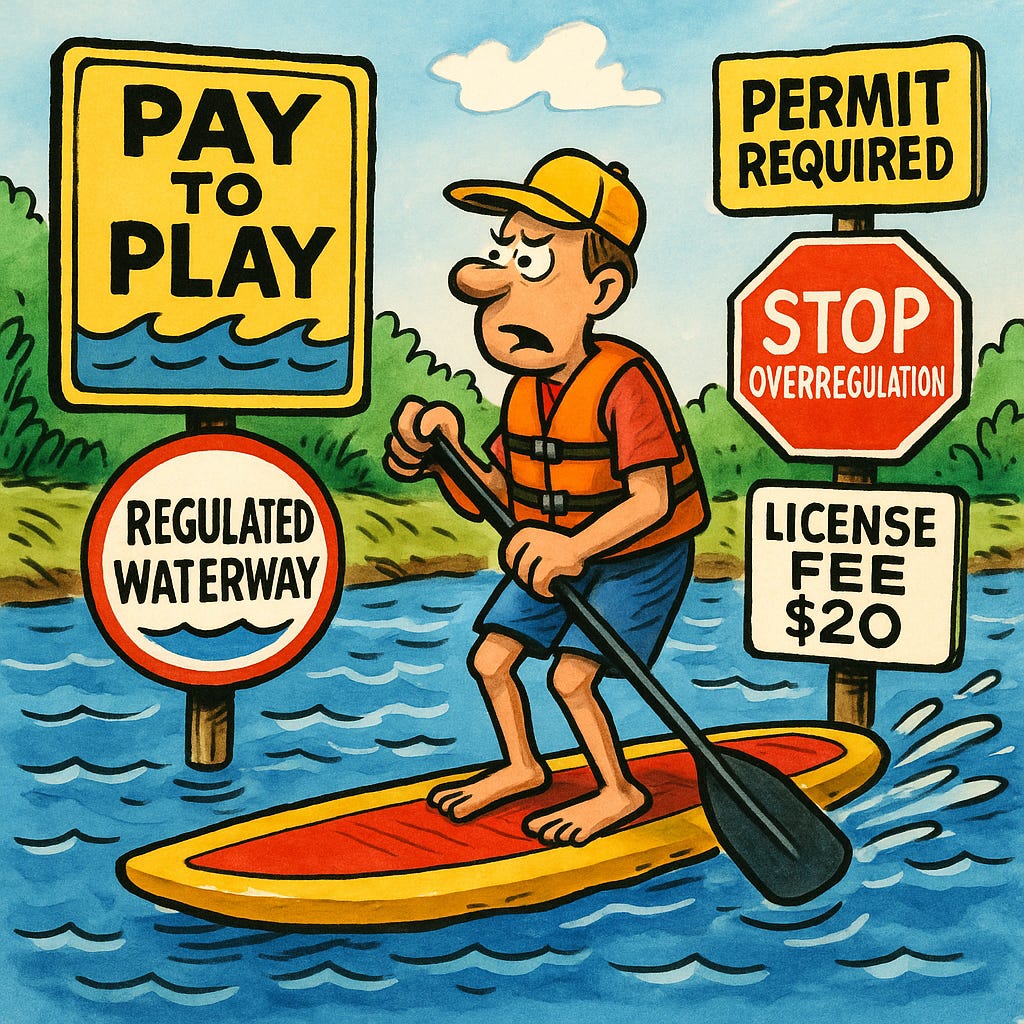The Freedom to Float
Oregon’s War on Paddleboards and Common Sense
Oregon’s lawmakers are at it again—proving that there’s no part of your life too mundane, too serene, or too absurdly innocent to regulate and tax. This time, they’ve set their bureaucratic sights on your paddleboard.
Effective January 1, 2026, a new law will require anyone paddling a canoe, kayak, SUP, or even a couple of inner tubes roped together to carry a Waterway Access Permit—a shining example of how Salem finds new ways to nickel-and-dime Oregonians for enjoying the natural resources we already fund.
Let’s call it what it is: a paddle tax.
What’s in This Nanny-State Nautical Nightmare?
Per the Oregon State Marine Board, this isn’t just about “safety” or “education.” The program is justified under the ever-expanding umbrella of the Aquatic Invasive Species (AIS) Prevention Program, which is just bureaucratese for “we want more of your money and control.”
Starting in 2026, every non-motorized watercraft—regardless of length—must have a permit:
One-week permit: $6
One-year permit: $20
Two-year permit: $35
(Plus fees, because of course there are.)
Buy it online, through an app, or from an agent—because nothing says "natural outdoor experience" like checking your phone for a state-issued digital permission slip.
And yes, the law used to exempt boats under 10 feet. But House Bill 2982 changed that, expanding the government’s grip to the tiniest of watercrafts. KPTV covered the permit expansion here.
So if your kid floats down the river on a glorified pool toy without a permit, you’re now in violation of state law.
Because Bureaucrats Know Better
Of course, kids 13 and under are technically exempt. How generous. Meanwhile, adults must not only pay the state for the privilege of floating but also carry:
A U.S. Coast Guard-approved life jacket
A sound-producing device (yes, a whistle. Next up: required foghorns on pool noodles?)
Don’t worry though—ODFW has an app for that.
What’s Really Going On?
Let’s not pretend this is about aquatic invasive species. If it were, we’d see real, targeted interventions—not a blanket tax on recreational paddlers who aren’t exactly the primary vector for environmental harm. This is about control. It’s about conditioning Oregonians to accept regulation of even the most benign freedoms.
What’s next—permits to hike into a forest? A fee for skipping stones? Taxing the breeze if your sail catches it?
The Statesman Journal rightly noted that this is a significant expansion of state boating fees. They buried the lede, though: this is about restricting access to Oregon’s public waters—waters we already pay to protect and preserve through taxes.
Who Loses?
Local families trying to enjoy a free weekend at the lake.
Tourists who don’t check the fine print.
Anyone who assumed that paddling down a river didn’t require government surveillance.
The only ones who win? The bureaucrats with their ever-expanding budgets and the politicians who’ll pretend this is “just a small fee” to protect the environment—while ignoring the forest of unintended consequences hiding behind the trees of red tape.
Oregon: Stop Taxing the Basics
Water access isn’t a luxury. It’s not a loophole. It’s not a threat to the public. It’s a birthright of living in a state as naturally rich as Oregon. If the government can tax your ability to paddle down a stream, there’s no telling what’s next. This law is an insult to common sense, an infringement on public access, and a prime example of bureaucratic creep.
Time to make some noise, Oregon. Just don’t forget your whistle.
Sources:


Democrats hate us.
How is the state of Oregon going to enforce permits for all watercraft on all waterways? In 2022 the state required permits to use the Columbia River Highway. In order to enter, you had to show proof of payment to a government employee. After a year, they cancelled the program and brought it back just for key places such as Multnomah Falls. It works because there are key access points the government can use to enforce it.
In order it enforce it the state will have to create a huge bureaucracy to collect the fee and enforce it. People will be able to avoid the fee by not using the key areas where government employees will be stationed. Are they going to have government boats checking all watercraft? They canceled the permit for the Columbia River Highway.
https://thatoregonlife.com/2022/05/starting-today-permits-needed-to-enter-columbia-gorges-waterfall-corridor/